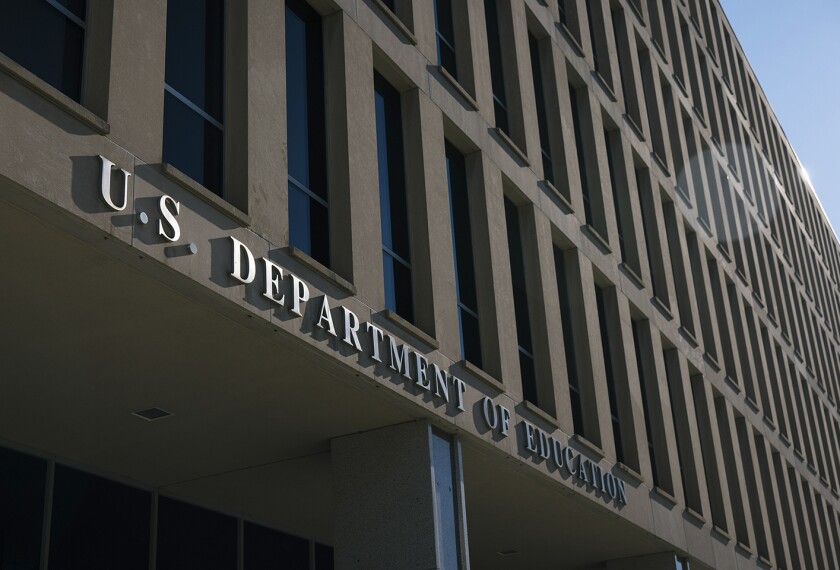Here are excerpts from Staff Writer Joetta L. Sack’s March 9, 2001, interview with Sen. Joseph I. Lieberman, D-Conn., about his education proposal and future plans. The interview took place in his Capitol Hill office.
Q. Why did the New Democrats decide to delve into education policy?
A. I got into it myself for a couple reasons. The first was, and it’s hard to say this without sounding trite, but the education of our children is so central to the future of our country and the future of our economy and the future of our children, and with that, the fact that it is clear that a lot of our schools are not adequately educating our children. Even though I’m not on the education committee, education looms large in our future, and the shortcomings of our education system are troubling, and are consequential.
We think if you want to help kids get a better education, you’ve got to have a better system of accountability and demanding results. You can’t just have more money and no demand for results. And, you can’t have a demand for results with no money. [President Bush] hasn’t asked for more money; he hasn’t really targeted this program to the disadvantaged. And, of course, he has some things in there like vouchers that we think ultimately are going to be nonstarters. So that’s the precis of the negotiation that we’ve been involved with.
We are at this point very hopeful, one, because we feel the debate is really moving to the center, both from the White House and Senate Republicans [and] ... also, the prospects that we’re actually going to get something done here, that is different, that is a very progressive step forward. ...
Q. The [New Democrats’] “Three R’s” bill hardly got any votes last year when it was proposed as an amendment. Are you concerned about getting enough votes this year?
A. I am. I don’t expect anybody’s proposal is going to pass as is, but I think that if Congress adopts an education reform authorization this year that’s signed by the president, it’s going to be something quite like our Three R’s bill. ... What was being reflected in that vote was the fact that we had a middle position. We had a third way. But neither of those first two ways were prepared to join us; nobody was going to vote for a compromise because it was pretty much acknowledged at that time that nothing was going to happen that year. Last year, the debate on education reform was just a debate. This year, it’s more than a debate—it’s a shared desire to get something done.
Q. You’ve supported voucher experiments for low-income students in the past, but you left vouchers out of the Three R’s bill. What is your current position on vouchers?
A. I have been interested in vouchers to the extent of supporting test programs across the country, just to see how they work, and only on two conditions. One, that they only involve low-income children, that is, children who arguably are trapped in a school that isn’t educating them, and they’re trapped because their parents don’t have the money to get them out of it. ... Second, is that they not take money out of the public school budget, because those schools need funding, particularly the schools in the poor areas. ... We didn’t include those kinds of proposals in the Three R’s bill, frankly, because I’ve concluded, having worked on it for three or four years, that it could bring down the whole attempt to pass a broad education reform and improvement bill.
Q. What do you think of President Bush’s plan for vouchers for students in failing schools?
A. I don’t support his plan because ... the problem is, it does take public money that ought to be going to public schools and it represents ... a surrender, or kind of giving up, on the public schools. And what we try to do in our bill is to achieve some of the same things that vouchers were intended to achieve. ... We’re going to invest more money in those schools, we’re going to demand performance for the kids, and if it doesn’t work, we’re going to give them a whole list of choices of other places to go. In the Senate, the political makeup has changed—support for vouchers in the Senate is lower now than it has been in the last six years.
Q. Do you have any future plans to run for higher office? Are you still in contact with Al Gore?
A. Yes, we’re in contact with him; he’s a very good friend. I’m extremely grateful for the opportunity he gave me last year, and I’m thrilled to be back here. I love the Senate. I’ve certainly been enriched by the experience I had running for national office.... So, four years is along way away, and for now I’m very glad to be here and very committed to passing a meaningful education reform act—and I think we’re in reach of that.




